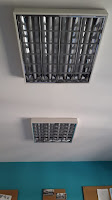Dar Si Hmad NGO supports its environmental
mission with changes in its own working space. Among the many decisions that
our organization took to contribute to the world’s big climate movement, even
though in a small way, is the minimization of electricity use in the office.
Thus, we have adopted three main measures in order to make our work place more
eco-friendly.
To start with, Dar Si Hmad replaced the
incandescent light bulbs in the office with led light bulbs. The latter aren’t
only more environmental-friendly, but they also have a longer life cycle, use
less energy, produce less heat and are safer as they contain no mercury. On a published article on the Energy
Saver governmental website, it was cited that “Residential LEDs --
especially ENERGY STAR rated products -- use at least 75% less energy, and last
25 times longer, than incandescent lighting”. Hence, the led light bulbs
in our office are both durable and energy-cost savers. And above all, we rarely
have to turn the lights on in the work place since it is generally naturally
illuminated.
All rooms in Dar Si Hmad contain large windows
that keep them full of light during the day time, a reason why we don’t
frequently run for artificial light. In fact, this wouldn’t have been possible
if we didn’t supply the windows with second glass panes that protect the place
from the cold and stormy weather all by allowing the sun rays to reach the inside of the
office when the outside wood panes are completely open.
The third step Dar Si Hmad follows to make its
office more eco-friendly is by unplugging the appliances that are not being
used. On October 2019, The New York Times pointed out statistics from the
Natural Resources Defense Council that say that the cost of plugged-in but not
used devices is about $165 per household, or $19
billion across the U.S. That amounts to about 44 million tons of carbon dioxide, or 4.6%
of the country’s total residential electricity generation.
All in all, it appears that controlling the
electricity consumption in the workplace isn’t only ecological, but also more economical.



